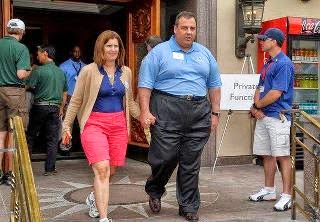Stuck With An Anti Same Sex Marriage Governor It Knocks on The State’s Supreme Court Instead
The emotional battle over legalizing same-sex marriage in New Jersey moved to state court today, where Judge Mary Jacobson sharply questioned lawyers for more than an hour on whether she should change the state law to allow them to take place.
Calling it a "historic day" and citing Martin Luther King's "I have a dream" speech, Lawrence Lustberg, the attorney for six same-sex couples and the gay-rights group Garden State Equality, argued that New Jersey must legalize same-sex marriage immediately in the wake of the U.S. Supreme Court's recent expansion of gay rights.
The attorney representing the state, Assistant Attorney General Kevin Jespersen, argued that federal courts, not state courts, should address any inequality.
At the state level, there is no inequality, the Christie administration argued, and New Jersey judges can't tell federal agencies what to do.
Jacobson, the head judge in Mercer County, asked for additional briefs to be filed by Aug. 28 and said she would issue a ruling next month at the earliest.
Lustberg said the U.S. Supreme Court extended more than 1,000 federal rights and obligations to same-sex couples in June by striking down the Defense of Marriage Act, which had defined marriage as only between a man and a woman. Those rights include tax benefits, inheritance rights and immigration rights for foreign-born spouses.
New Jerseyans can't reap those benefits because a state law passed in 2007 allows only civil unions, not marriages, for same-sex couples, he argued.
"The fact that it's not marriage matters a great deal," Lustberg argued. "Each of the statutes that we cite use the term marriage — they don't say 'marriage or its equivalents' — they say marriage."
Jacobson asked pointed questions of both sides, noting at one point that none of the couples in court has yet suffered a "concrete harm" in the aftermath of the federal ruling.
If any of them were federal employees denied a joint health-insurance plan, for example, they would have legal standing to sue, yet none of them are. Lustberg said after the hearing that four members of Garden State Equality were federal employees, and that he would submit additional filings to the court before the deadline set by Jacobson.
"Many judges and justices on a state and federal level say on such far-reaching matters, such as same-sex marriage, it ought to be decided by the political process rather than by the courts," Jacobson told Lustberg at one point.
The Democratic-controlled New Jersey Legislature passed a bill allowing same-sex marriage last year, but Christie vetoed it. Although Senate President Stephen Sweeney (D-Gloucester) has pledged to hold an override vote by the end of the year, he and Democrats in the Assembly have yet to round up the two-thirds majority needed in each chamber for a successful override.
"Waiting means waiting indefinitely, all the while my clients and same-sex couples are denied the incredibly important rights we're discussing here today," Lustberg replied. "There are times in our history when our democratic process doesn't get it right, and courts are called upon to weigh (the issue). This is one of those times."
The Republican governor opposes same-sex marriage, and has said the courts would be overstepping their bounds by allowing them in New Jersey. But Christie also said in his veto message last year that he was "adamant" that couples united in a civil union receive the same rights and benefits as married couples.
Jespersen, the state assistant attorney general arguing Christie's case, said the lawsuit should go to a federal and not a state court.
"If the federal government treats civil union partners and civil marriage partners differently ... does that comport with federal equal protection?" he asked. "If the answer is no, it's the federal government that's violating equal protection rights."
Some federal agencies have reacted to the DOMA ruling by declaring that only same-sex marriages, not civil unions, may reap the new benefits extended by the U.S. Supreme Court.
Jespersen suggested those agencies might be violating federal law, and that the federal government should correct it.
Jacobson seemed skeptical.
"It seems like you're asking the federal government to do something very complicated -- 'look at all the states to see what kinds of definitions of marriage there are,'" she said.
She also pointed to a 2006 ruling by the New Jersey Supreme Court in the case Lewis v. Harris. The decision by Justice Barry Albin established that same-sex couples must get all the same rights as opposite-sex couples, but it let the Legislature decide whether to call it marriage or something else.
"It's a very strong opinion on how important equality was," Jacobson said. "I don't think it would be so unthinkable that the New Jersey Supreme Court would extend these protections to protect New Jersey citizens from disadvantages imposed on them."
No matter how Jacobson rules, the case may end up back at the state Supreme Court soon. Chief Justice Stuart Rabner told Michael Aron of NJT in June that "it's safe to assume" any ruling at the trial court would be appealed.
nj.com


Comments